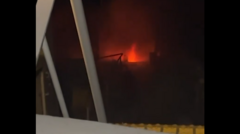Tensions escalate in the Middle East as the Iranian-backed Houthi militia targets Israel, with direct impacts on civilian travel and safety.
Houthi Missile Strike Near Tel Aviv Airport Raises Alarm

Houthi Missile Strike Near Tel Aviv Airport Raises Alarm
A missile from Yemen injures two and temporarily halts flights at Ben-Gurion Airport amid rising regional tensions.
The recent missile strike near Tel Aviv's Ben-Gurion Airport marks a significant escalation in regional conflict, reflecting the ongoing volatility in Middle Eastern geopolitics.
Israeli security forces responded quickly to a missile launched from Yemen, which struck close to the main terminal of the Ben-Gurion International Airport. Occurring on May 4, 2025, the strike led to the temporary suspension of flights, although initial reports confirmed that no fatalities resulted from the attack. The Israeli military attempted to intercept the missile and later identified its impact site within the airport vicinity, indicating heightened security measures.
The Israeli emergency ambulance service reported that two individuals suffered injuries from the blast, with a third injured while seeking shelter amid chaos. Eyewitness accounts and social media postings revealed large plumes of smoke rising from the area, causing panic as flight passengers and airport staff evacuated.
Prior to the missile attack, the Israeli Airport Authority announced the day's schedule of 422 international flights. Following protocol, the airport authority stated that operations would resume imminently despite the disruption.
This incident reflects the ongoing military activities of the Iranian-backed Houthi militia, which has increasingly targeted Israel since a cease-fire cessation mid-March amidst heightened conflict in Gaza, aligning itself with Hamas. The Israeli military has intercepted many missiles, although fragments have frequently landed within Israeli territory, contributing to a growing atmosphere of uncertainty and fear.
Analysts suggest that incidents like this could have broader implications for regional stability, prompting discussions about the response strategies both within Israel and among international stakeholders involved in Middle Eastern affairs. The complexities of these relations are further highlighted by underlying tensions between different state and non-state actors in the region, challenging diplomatic solutions.
As developments unfold, the impact on international air travel and civilian safety in Israel raises critical questions about security protocols and the future trajectory of Middle Eastern conflicts in an increasingly intertwined global landscape.
Israeli security forces responded quickly to a missile launched from Yemen, which struck close to the main terminal of the Ben-Gurion International Airport. Occurring on May 4, 2025, the strike led to the temporary suspension of flights, although initial reports confirmed that no fatalities resulted from the attack. The Israeli military attempted to intercept the missile and later identified its impact site within the airport vicinity, indicating heightened security measures.
The Israeli emergency ambulance service reported that two individuals suffered injuries from the blast, with a third injured while seeking shelter amid chaos. Eyewitness accounts and social media postings revealed large plumes of smoke rising from the area, causing panic as flight passengers and airport staff evacuated.
Prior to the missile attack, the Israeli Airport Authority announced the day's schedule of 422 international flights. Following protocol, the airport authority stated that operations would resume imminently despite the disruption.
This incident reflects the ongoing military activities of the Iranian-backed Houthi militia, which has increasingly targeted Israel since a cease-fire cessation mid-March amidst heightened conflict in Gaza, aligning itself with Hamas. The Israeli military has intercepted many missiles, although fragments have frequently landed within Israeli territory, contributing to a growing atmosphere of uncertainty and fear.
Analysts suggest that incidents like this could have broader implications for regional stability, prompting discussions about the response strategies both within Israel and among international stakeholders involved in Middle Eastern affairs. The complexities of these relations are further highlighted by underlying tensions between different state and non-state actors in the region, challenging diplomatic solutions.
As developments unfold, the impact on international air travel and civilian safety in Israel raises critical questions about security protocols and the future trajectory of Middle Eastern conflicts in an increasingly intertwined global landscape.



















